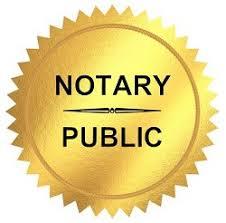Debunking Notarial Work: Streamlining the Role and Relevance of Notaries
In the elaborate internet of lawful documentation and confirmation, notaries stand as columns of assurance and authenticity. Their function, frequently shrouded in enigma for several, carries significant weight in making sure the legitimacy and honesty of crucial files. As guardians of legitimacy and reality, notaries play a critical part in our society, yet their work is not always completely comprehended. By untangling the intricacies losing and surrounding notarial methods light on the importance of their acts, a clearer understanding arises of the crucial duty notaries play in supporting the fabric of legal and lawful agreements.
The History of Notarial Work
Exactly how did notarial job progress gradually to end up being an integral part of lawful and business purchases? The history of notarial job go back to ancient people, where scribes played a crucial duty in taping essential information and verifying records. As cultures advanced, the demand for an extra formalized system to guarantee the validity of arrangements arose. This led to the growth of notaries, people appointed by the state to work as objective witnesses in lawful matters.
During the Middle Ages, notaries acquired prominence in Europe, with their functions expanding to include preparing lawful documents, certifying trademarks, and maintaining documents. The rise of worldwide trade better emphasized the value of notarial job in verifying contracts and agreements across borders.
In the contemporary age, notaries remain to play a crucial duty in lawful and organization purchases by verifying identities, confirming the authenticity of files, and protecting against fraudulence. Their role in certifying the validity of agreements adds a layer of safety and trust fund to the ever-evolving landscape of business and regulation.

Obligations and Responsibilities of Notaries
Notaries play a crucial role in verifying the authenticity of records and the identification of notaries. One of their main obligations is to witness the finalizing of crucial files, such as deeds, wills, and agreements, to guarantee that all events are entering into arrangements intentionally and voluntarily.
Moreover, notaries are tasked with carrying out vows and affirmations, which are vital in legal procedures and the execution of sworn statements. They license copies of original papers, providing assurance to establishments that the duplicates hold true reproductions of the originals. Notaries must preserve precise records of all purchases they manage to ensure transparency and liability. Overall, the responsibilities and obligations of notaries are vital in guarding the integrity and validity of numerous papers and deals.
Notarial Certificates and Signatures
Exemplifying precise interest to detail, notarial certificates and signatures offer as important parts in verifying the credibility of legal papers. Notarial certifications generally consist of crucial information such as the date of notarization, the names of the signatures, a description of the file, and the notary's official seal. These certifications offer a clear record of the notarial act, ensuring that the record can be conveniently recognized and mapped back to the notary that oversaw the process.
Trademarks play a crucial function in notarial job, as they indicate the arrangement and approval of the parties entailed. Notaries thoroughly witness the finalizing of papers to verify the identification of the notaries and confirm that they are authorizing of their own cost-free will. By attaching their official seal and trademark to the document, notaries see here now license that the essential procedures have actually been followed which the document is enforceable and legitimate.
In essence, notarial certifications and signatures are the characteristic of authenticity in lawful transactions, supplying guarantee to all parties included that the records are legitimate and binding.
Value of Notarial Acts

Registration Refine Explained
Discussing the registration procedure provides clarity on the vital actions entailed in confirming legal papers. The notarization procedure generally starts with the private presenting the document to a notary public. The notary then verifies the endorser's identity through acceptable recognition methods. When the identification is validated, the notary makes sure that the specific signing the paper does so voluntarily and with no browbeating.

Final Thought

Notarial certifications typically have critical info such as the day of notarization, the names of the signatures, a summary of the file, and the notary's main seal. These certifications offer a clear document of the notarial act, guaranteeing that the record can be quickly recognized and traced back to the notary that oversaw the process.
By attaching their official seal and signature to the file, notaries accredit that this page the needed treatments have been followed and that the file is enforceable and legitimate.
By validating the identification of the signatures, confirming their determination to get in right into the contract, and accrediting the day and location of the finalizing, notaries play an essential duty in promoting the legitimacy of lawful papers.After the paper is signed, the notary will fasten their main seal or stamp onto the paper.